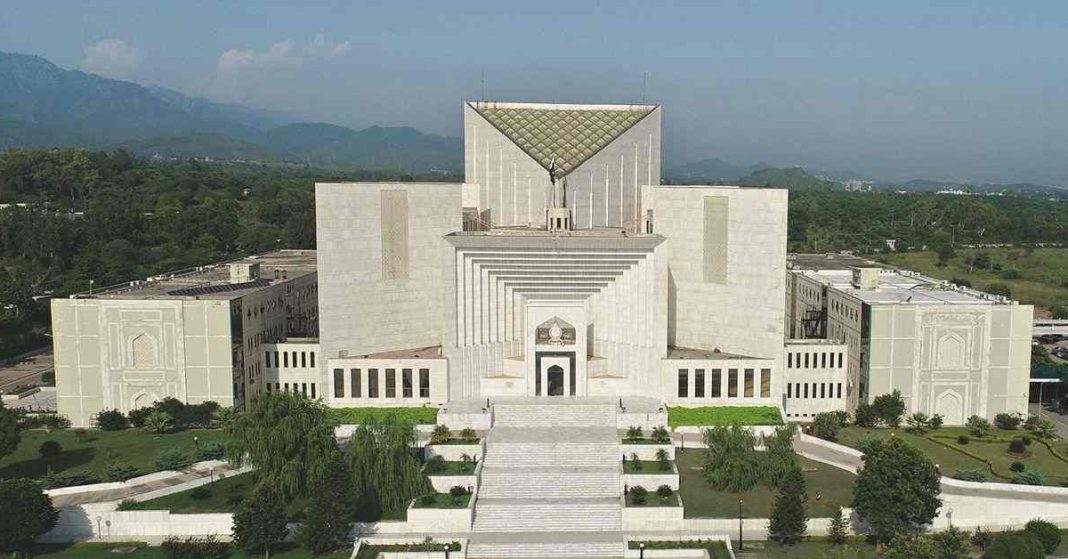On Wednesday, Pakistan Tehreek-e-Insaf (PTI) filed a petition in the Supreme Court contesting the recently approved Election Act Amendment Bill. PTI Chairman Barrister Gohar Ali Khan, through Advocate Salman Akram Raja, submitted the plea under Article 184(3) of the Constitution, naming the federal government and the Election Commission of Pakistan (ECP) as respondents.
The petition argues that the bill, passed by a majority vote in the National Assembly despite strong opposition, is “unconstitutional and illegal”. PTI is also requesting an immediate halt to the allocation of reserved seats to other political parties, asserting their entitlement based on the Supreme Court’s July 12 decision.
The July 12 ruling by a 13-judge bench was a significant setback for Prime Minister Shehbaz Sharif’s coalition, affirming PTI’s right to reserved seats for women and non-Muslims. The recent legislation, which PTI views as an attempt to circumvent this ruling, has intensified the legal battle. The party argues that the bill undermines democratic principles and is a politically motivated response to their growing influence in the assembly.
Legislative Amendments and PTI’s Concerns
The Election Act Amendment Bill, which sailed through both the National Assembly and the Senate, is perceived by PTI as a move to reverse its recent gains. The bill introduces several key changes, including a prohibition on independent candidates switching party affiliations post-election. It also amends Section 66 to classify candidates who do not declare party affiliation as independents, and Section 104 to restrict the submission of reserved seat lists to a specific timeframe.
PTI has criticized the bill for potentially nullifying the Supreme Court’s ruling, arguing that it aims to undermine their position. PTI MNA Ali Muhammad Khan condemned the bill as an attack on judicial authority, reiterating the party’s commitment to challenging it in court. The legislation’s passage despite opposition resistance has drawn sharp reactions from PTI members, who view it as a direct assault on the judiciary’s authority.
Government Defense and Legislative Justifications
Federal Law Minister Azam Nazeer Tarar defended the bill, emphasizing that it was drafted before the Supreme Court’s ruling and aims to clarify and enhance the electoral process. Tarar asserted that the bill represents Parliament’s right to amend laws and should not be seen as an infringement on the judiciary’s role. He stressed the need for legislative clarity and the distinction between interpreting and rewriting the Constitution.
Read More: FO Announces Support for People of Bangladesh
Despite the government’s stance, the opposition perceives the amendments as an effort to stymie PTI’s resurgence. PTI’s Shibli Faraz argued that the bill was introduced in “bad faith” and intended to obstruct the implementation of the Supreme Court’s verdict. The legislative maneuvering has sparked a robust debate about the balance of power between Parliament and the judiciary.
Implications for Pakistani Politics
The legal battle over the Election Act Amendment Bill underscores the ongoing tension between PTI and the ruling coalition. With the bill potentially reversing PTI’s gains, the Supreme Court’s forthcoming decision will be crucial in determining the future political landscape. The case highlights broader issues of constitutional authority and the interplay between legislative and judicial branches in Pakistan’s political system.
As the Supreme Court reviews PTI’s petition, the outcome will likely have significant implications for Pakistan’s electoral processes and the balance of power among its institutions. Both the government and PTI are closely monitoring the developments, which will shape the political dynamics leading up to future elections.














